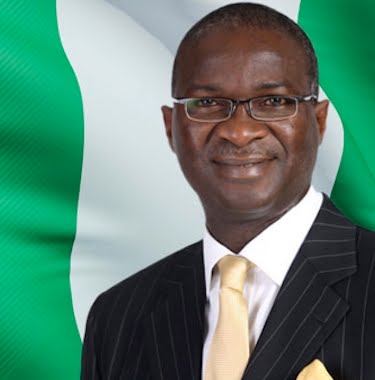Fashola: It Will Be Transformation All The Way
By Benedict Audu
On March 2, 2013, The Economist of London, arguably the world’s most
influential magazine, published a special issue on Africa, a follow-up
to its “Africa Rising” series run in 2011. In an article entitled
“Governance in much of Africa is visibly improving, though progress is
uneven”, the magazine cited two Nigerian state governors as
outstanding. One was Kayode John Fayemi of Ekiti State, regarded as
sophisticated and IT savvy. The other was, of course, Babatunde
Fashola for his stunning work in Lagos State.
Said the conservative weekly which often holds critical views on Third
World leaders: “Lagos, (Nigeria’s)commercial capital, long a byword
for chaos and skullduggery….Already home to 20m people, the city is
expected to double in size within a generation. When most of the
infrastructure was built in the 1970s, the population was perhaps 2m.
But help is on the way. The governor of Lagos State, Babatunde
Fashola, has begun an impressive campaign to clean up the city….Now,
there is an orderly queue for taxis. The Chinese are building a vast
modern rail network. Public buses have been assigned separate lanes.
When the governor heard that they were being used by unauthorized
vehicles, he strode one morning and made a citizen arrest of a
colonel. …the transformation of Lagos is worth trumpeting. Its economy
is now bigger than the whole of Kenya’s. Tax revenue has increased
from $4m to $97m a month in less than a decade. Tax rates have
remained the same, but the amounts being collected have risen
dramatically”.
Interestingly, both Fayemi and Fashola have been nominated to become
ministers in the President Muhammadu Buhari administration. It shows
that the forthcoming cabinet is most likely to work in a way which
will impress not just Nigerians but also the international community.
There is a general belief that Fashola will be the next Minister of
the Federal Capital territory. In other words, Buhari is set to make
history by becoming what literary scholars call a mythmaker. No
southerner has ever headed the FCT Ministry. Therefore, Buhari will be
setting a precedent by appointing Fashola the FCT Minister. He will
break a major political taboo in Nigeria, thus casting the new
president in the image of a true nationalist, a pan Nigerian leader of
the finest hue. Yet, it would seem that Buhari’s reason for wanting to
send Fashola to the FCT is not so much to break any political taboo as
to make Abuja a truly international territory. Fashola is a perfect
fit.
If Fashola is deployed to this ministry, he will go fully prepared, as
Professor Chinua Achebe said of Nigeria’s current literary star,
Chimamanda Ngozi Adichie. I told a correspondent of the Voice of
America (VOA) in a recent interview that anyone who could turn Oshodi
from a bedlam and eyesore which caused traffic gridlock of epic
proportions into an orderly, beautiful spectacle, complete with a
garden and recreational facilities, could easily make Abuja an
international tourist destination where people go for business, as is
the case with Dubai and now Abu Dhabi. No one should be surprised at
the transformation Lagos underwent under Fashola’s leadership. Right
from the day he took to law practice, Fashola, who had all his life
been too playful, decided to turn a new leaf by putting all his mind,
heart and soul into everything he set out to do. He thus became a
Senior Advocate of Nigeria (SAN) at almost the callow age of about 40
years. Everyone who ever met or worked with him when he was the Chief
of Staff in Lagos State testifies to his clarity of vision, solidity
of character, integrity and organizational skills.
Fashola approached his work as Lagos State governor with unusual
fervor; he felt challenged and inspired by the examples of global
transformational leaders. He devoured various books on leadership,
including Leadership by Rudy Giuliani, New York mayor from 1994 to
2001 who restored competitiveness to the city and displayed greater
leadership than even President George Bush W. Bush during the 9/11
terrorist attacks in New York. Fashola also studied From Third World
To First: The Story of Singapore from 1965 by Lee Kuan Yew. He went on
a study tour of these phenomenal cities. He actually took time out
during the International Bar Association conference in Singapore in
2008 to have a private meeting with Singapore’s founding prime
minister, the legendary Lee kuan Yew, on leadership. So, when Fashola
began the project to turn Lagos into a megacity, he meant business.
The result today is out for all to see. His impressive record has
attracted the attention of international media like the CNN
International, BBC, Financial Times of London and many others. Daily
Telegraph of the United Kingdom described him on October 24, 2014, as
the “the man who tamed Nigeria’s most lawless city”. In April, 2015,
as he was preparing to leave office, the International Crisis Group,
one of the world’s most respected research organizations, honoured him
as one of the seven outstanding personalities around the world for
tackling security, economic and social challenges in a very
imaginative way. Earlier onJanuary 1, 2014, another globally
influential think tank, Lo Spacio della Political (LSDP), based in
Italy and Belgium and composed of natural and social scientists as
well as writers, had named him, alongside the economically creative
Prime Minister of Japan, Shinzo Abe, a Global Thought Leader for 2013.
In Nigeria, practically every newspaper and magazine has honoured him
with the Man of the Year award. The same goes for other organizations.
Fashola came into office with concrete ideas about high public office.
He never used siren, most unusual of a Nigerian state governor. He
never moved in long motorcades, with security detail relating
menacingly to the public. He never accepted any chieftaincy title, as
he preferred to be known as simply Mr Fashola. He rejected the award
of honorary doctorates from different universities and also politely
turned down a high national honour from Dr Goodluck Jonathan when the
latter was the president. He is convinced that it is not right for
public office holders to accept all manner of awards while in office.
After all, we have seen high public officers fall from grace for
scandalous conduct.
As has been pointed out several times, Fashola’s stellar performance
helped to revive the dying progressive politics of the South-West. He
was from 2007 the only Action Congress of Nigeria (ACN) governor in
the whole country until stolen mandates were recovered in Osun, Ekiti
and Oyo states. People in the Southwest voted ACN in 2011 because the
electorate was promised governance resembling that of Fashola’s Lagos
State. Consequently, the considerable number of states under its
control made it possible for the ACN to play a decisive role in the
emerge of the APC, which made history last March by defeating, for the
first time in Nigeria’s history, a ruling national party.
Mallam el-Rufai, the current governor of Kaduna State, displayed
courage and vision while serving as the FCT minister from 2003 to 2007
during the Olusegun Obasanjo presidency. If Fashola assumes leadership
of this ministry, Abuja will in not too distant future begin to
compete with world cities like Dubai. It will be ceaseless
transformation all the way. Mark my word.
Audu is chief executive of an indigenous engineering consulting firm
 Hottestgistnaija.com
Hottestgistnaija.com






